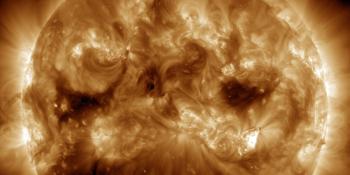Viewing archive of Wednesday, 4 December 2024
Daily bulletin on solar and geomagnetic activity from the SIDC
Issued: 2024 Dec 04 1233 UTC
SIDC Forecast
Solar flares
C-class flares expected, (probability >=50%)
Geomagnetism
Quiet (A<20 and K<4)
Solar protons
Quiet
| 10cm flux | Ap | |
|---|---|---|
| 04 Dec 2024 | 180 | 007 |
| 05 Dec 2024 | 184 | 007 |
| 06 Dec 2024 | 186 | 007 |
Solar Active Regions and flaring
Solar flaring activity has reached moderate levels, with several C-class flares and one M-class flare recorded over the past 24 hours. The largest flare was an M2.3 flare, peaking at 10:00 UTC on December 4. It was associated with an active region (AR) behind the east limb (S09E89), which is currently rotating onto the solar disk.There are currently eight numbered active regions visible on the solar disk. SIDC Sunspot Group 323 (NOAA Active Region 3906; beta-gamma) is the largest and most complex region on the disk but has only produced C-class flares in the past 24 hours. It is expected to rotate over the west limb within the next few hours, along with SIDC Sunspot Group 322 (NOAA Active Region 3905; beta-gamma), that was inactive over the past 24 hours. Low flaring activity was also produced by SIDC Sunspot Group 330 (NOAA Active Region 3916; beta). Other regions on the disc have simple configuration of their photospheric magnetic field (alpha and beta) and have not shown any significant flaring activity. Solar flaring activity is expected to be at low levels over the next 24 hours, with C-class flares very likely and a chance of M-class flares.
Coronal mass ejections
No Earth-directed coronal mass ejections (CMEs) have been detected in the available coronagraph imagery over the past 24 hours.
Coronal holes
A positive polarity mid-latitude coronal hole (SIDC Coronal Hole 60) started to cross the central meridian.
Solar wind
Over the past 24 hours, the solar wind parameters (ACE and DSCOVR) reflected the waning influence of the ICME. The interplanetary magnetic field magnitude decreased from 10 nT to 8 nT. The solar wind speed ranged between 420 km/s and 500 km/s. The southward component of the interplanetary magnetic field fluctuated between -6 nT and 6 nT. Solar wind parameters are expected to gradually return to slow solar wind conditions over the next few days.
Geomagnetism
Geomagnetic conditions over the past 24 hours were quiet to unsettled globally (NOAA Kp: 2 to 3). Locally, over Belgium, an active period was registered between 18:00 and 22:00 UTC on December 3 (K-Bel: 4). Quiet to unsettled geomagnetic conditions are expected over the next 24 hours.
Proton flux levels
The greater than 10 MeV GOES proton was below the 10 pfu threshold over the past 24 hours. It is expected to remain below the threshold level over the next 24 hours. There is a small chance that the proton flux may increase in case of strong flaring from SIDC Sunspot Group 323 (NOAA Active Region 3906).
Electron fluxes at geostationary orbit
The greater than 2 MeV electron flux, as measured by the GOES-16 satellite, remained below the 1000 pfu alert threshold, and it is expected to remain below the threshold during the next 24 hours. The 24h electron fluence was at normal levels and is expected to remain at these levels.
Today's estimated international sunspot number (ISN): 114, based on 04 stations.Solar indices for 03 Dec 2024
| Wolf number Catania | 162 |
| 10cm solar flux | 185 |
| AK Chambon La Forêt | 018 |
| AK Wingst | 012 |
| Estimated Ap | 014 |
| Estimated international sunspot number | 121 - Based on 15 stations |
Noticeable events summary
| Day | Begin | Max | End | Loc | Strength | OP | 10cm | Catania/NOAA | Radio burst types | |
|---|---|---|---|---|---|---|---|---|---|---|
| None | ||||||||||
Provided by the Solar Influences Data analysis Center© - SIDC - Processed by SpaceWeatherLive
All times in UTC
Current data suggests there is a slight possibility for aurora to appear at the following high latitude regions in the near future
Iqaluit, NUNuuk
Reykjavik
Latest news
Latest forum messages
Support SpaceWeatherLive.com!
A lot of people come to SpaceWeatherLive to follow the Sun's activity or if there is aurora to be seen, but with more traffic comes higher server costs. Consider a donation if you enjoy SpaceWeatherLive so we can keep the website online!

Latest alerts
Thursday, 10 April 2025
23:00 UTC - Geomagnetic activity
Active geomagnetic conditions (Kp4) Threshold Reached: 22:47 UTC
20:45 UTC - Hemispheric Power Index
The OVATION model predicts the Hemispheric Power Index to reach 50GW at 21:37 UTC
01:45 UTC - Geomagnetic activity
Active geomagnetic conditions (Kp4) Threshold Reached: 01:41 UTC
Wednesday, 9 April 2025
08:12 UTC - Hemispheric Power Index
The OVATION model predicts the Hemispheric Power Index to reach 76GW at 08:57 UTC
Space weather facts
| Last X-flare | 2025/03/28 | X1.1 |
| Last M-flare | 2025/04/08 | M1.5 |
| Last geomagnetic storm | 2025/04/06 | Kp5 (G1) |
| Spotless days | |
|---|---|
| Last spotless day | 2022/06/08 |
| Monthly mean Sunspot Number | |
|---|---|
| March 2025 | 134.2 -20.4 |
| April 2025 | 144.7 +10.5 |
| Last 30 days | 138.8 +1.3 |




